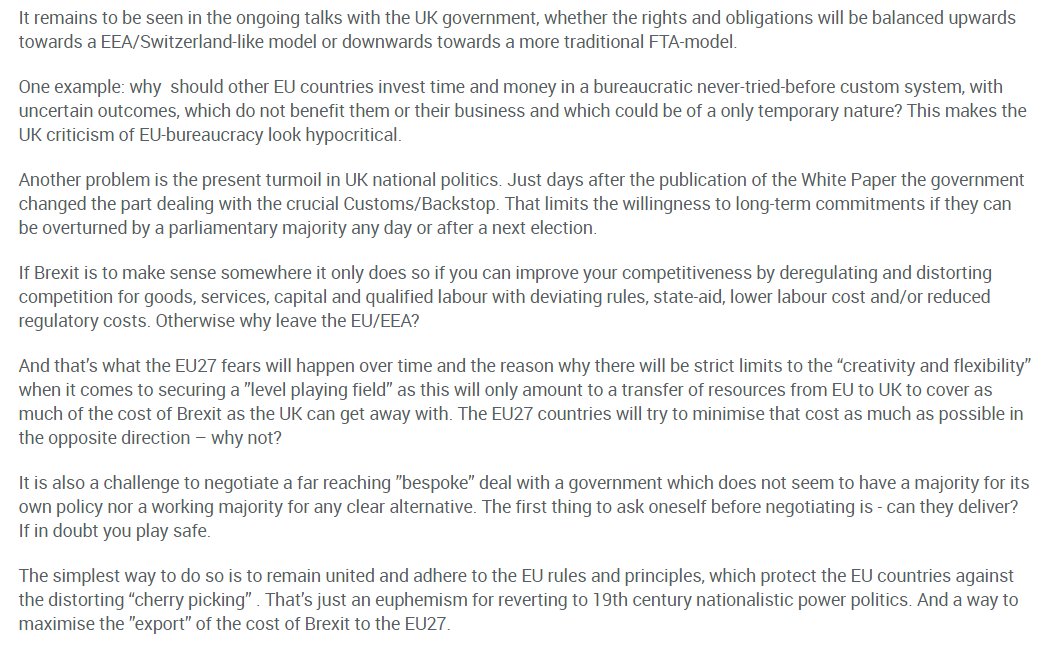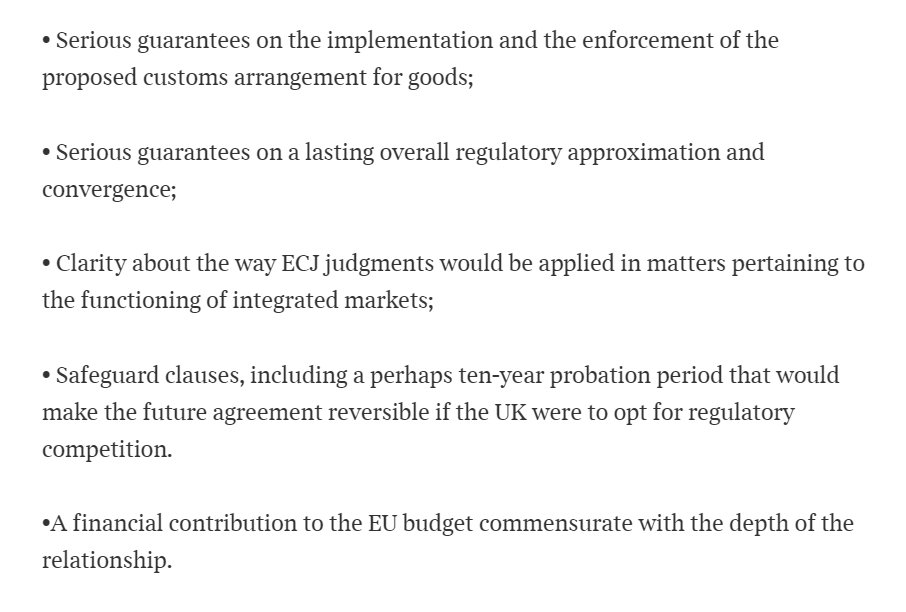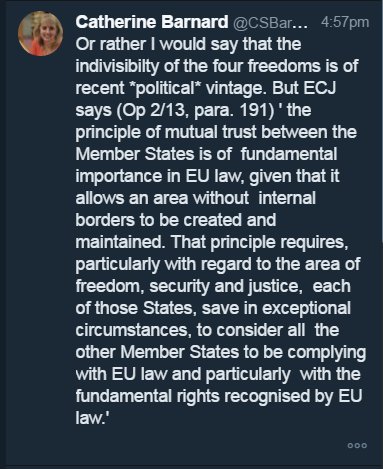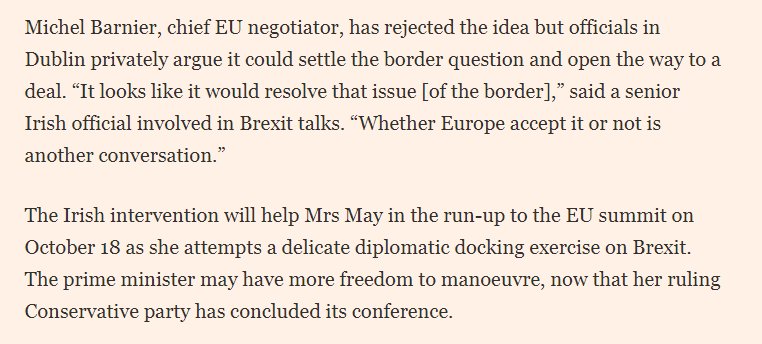Why did the European Commission not publish killer assessments of May's 'single market for goods' #Brexit pitch? How did the Brits get hold of them so quickly? Some thoughts. 1/THREAD
telegraph.co.uk/politics/2018/…
telegraph.co.uk/politics/2018/…
First the bugging part. Did the spooks at GCHQ/MI6 have a hand in procuring the slides, or contents thereof, from the July 5 Article 50 Working Group?
Frankly, who knows? It's sure not impossible - recall Obama's NSA bugged Merkel - but EU concerns speak to the lack of trust/2
Frankly, who knows? It's sure not impossible - recall Obama's NSA bugged Merkel - but EU concerns speak to the lack of trust/2
Just as plausibly one of those attending briefed the Brits that the Commission was about to fire a pre-emptive strike against May's expected Brexit pitch on the day of Chequers.
If that's what happened, it raises several interesting questions. /3
If that's what happened, it raises several interesting questions. /3
Did/do some member states think there's a danger that the ultra-theological Commission/Selmayr view is in danger of shutting down space for a deal?
Did they maybe think the Commission econ assessments were unhelpful/overblown?
And.... /4
Did they maybe think the Commission econ assessments were unhelpful/overblown?
And.... /4
....does the fact that the Brits succeeded in intervening to stop the Commission's planned publication of the assessments mean that there is more softness among EU member states than the Commission over splitting the 'four freedoms'?
Mmmmm.... /5
Mmmmm.... /5
That last one might be tempting conclusions for Brits to draw, but it may also be wishful thinking.
If there's a 'no deal' the EU does not want to be seen as responsible. The decision not to prevail on Barnier not to publish was likely more tactical than ideological. /6
If there's a 'no deal' the EU does not want to be seen as responsible. The decision not to prevail on Barnier not to publish was likely more tactical than ideological. /6
What about the contents of the slides themselves?
We know Mr Barnier's misgivings about allowing the UK to diverge on services while align on goods.
These assessments appeared to try to quantify that risk in alarming terms. /7
We know Mr Barnier's misgivings about allowing the UK to diverge on services while align on goods.
These assessments appeared to try to quantify that risk in alarming terms. /7
The Commission can see the UK pitch: you, the EU run a £95bn surplus in goods with UK, so what's not to like? This makes sense for the both of us?
Well, says the Commission. This is what's not to like - you crack the vessel of the Single Market. /8
Well, says the Commission. This is what's not to like - you crack the vessel of the Single Market. /8
Even marginal advantages of 1-2 per cent add up.
Give the Brits free access for goods, and freedom to cut corners on service components of goods would be very short-sighted.
It could cost 8-9% GDP over 15 years, or 0.5% a year - the same as a 'no deal' for UK /9
Give the Brits free access for goods, and freedom to cut corners on service components of goods would be very short-sighted.
It could cost 8-9% GDP over 15 years, or 0.5% a year - the same as a 'no deal' for UK /9
The aim is to stiffen the spines of Member states who might be tempted.
To warn them not be hoodwinked by clever British negotiators into a deal which gives them '3.5' freedoms - essentially what Cameron wanted all along.
Don't do it. Don't do it. /10
To warn them not be hoodwinked by clever British negotiators into a deal which gives them '3.5' freedoms - essentially what Cameron wanted all along.
Don't do it. Don't do it. /10
So is the Commission right? Or engaged in theocratic scaremongering to the flock about the long road to perdition? The EU's own project fear.
John Springford @JohnSpringford of the @CER_EU reckons the numbers are a stretch - IF the UK agreed to keep aligned on future rules. /11
John Springford @JohnSpringford of the @CER_EU reckons the numbers are a stretch - IF the UK agreed to keep aligned on future rules. /11
@JohnSpringford @CER_EU That would be an advance on #Chequers (which promises only not to stick to past rules) but coupled with promises on State Aid/Competition @JohnSpringford reckons could lock the Brits in satisfactorily.
Perhaps that's Barnier's game? To force the Brits to move? /12
Perhaps that's Barnier's game? To force the Brits to move? /12
@JohnSpringford @CER_EU Or is it something more fundamental?
Is that, even if the Brits could be chained to future rules, the EU just does not want to create a structure that could prove a template for others? Like Hungary. Or even a populist Italy, if the eurozone crunch comes? /13
Is that, even if the Brits could be chained to future rules, the EU just does not want to create a structure that could prove a template for others? Like Hungary. Or even a populist Italy, if the eurozone crunch comes? /13
@JohnSpringford @CER_EU And would such a relationship be manageable with an economy of the size and heft of the UK? Would the mechanisms to police alignment really be workable?
Viewed this way, Chequers starts to look like a reheat of the old cake and eat it. It cannot fly. /14
Viewed this way, Chequers starts to look like a reheat of the old cake and eat it. It cannot fly. /14
@JohnSpringford @CER_EU That seems to be the message from even friends of UK like @GrubeClaus the Anglophile former Danish ambassador to London and Brussels, writing here in @esharpmag /15
esharp.eu/debates/the-uk…
esharp.eu/debates/the-uk…

@JohnSpringford @CER_EU @GrubeClaus @esharpmag There have been serious voices arguing the EU pink it's own red lines like @pisaniferry @GuntramWolff et al but it seems to me the politics of this are super-hard for the EU at 27. /16
thetimes.co.uk/article/the-eu…
thetimes.co.uk/article/the-eu…

@JohnSpringford @CER_EU @GrubeClaus @esharpmag @pisaniferry @GuntramWolff The Commission legal service, and figures like @piris_jc argues that the four freedoms are legally indivisible - they cite ECJ 2/13 as the basis for this. I defer to lawyers like @CSBarnard24 who say the indivisibility of the freedoms is the foundation of mutual trust /17
@JohnSpringford @CER_EU @GrubeClaus @esharpmag @pisaniferry @GuntramWolff @piris_jc @CSBarnard24 Which is all a long-winded way of saying that Chequers - or the cherry-picked 'ask' at the heart of Chequers - is a tough.
Because even if some MS are flexible, whose version of flexibility wins out? In whose interests?
Politically, easier for EU to hold C'ion line. /18
Because even if some MS are flexible, whose version of flexibility wins out? In whose interests?
Politically, easier for EU to hold C'ion line. /18
@JohnSpringford @CER_EU @GrubeClaus @esharpmag @pisaniferry @GuntramWolff @piris_jc @CSBarnard24 To do otherwise would be a massive leap.
It would be to accept that flexibility is, long term, the road to salvation for the EU, not perdition.
The ancien regime will fall if it doesn’t flex; but if it flexes, it fears it will fall. /19
It would be to accept that flexibility is, long term, the road to salvation for the EU, not perdition.
The ancien regime will fall if it doesn’t flex; but if it flexes, it fears it will fall. /19
@JohnSpringford @CER_EU @GrubeClaus @esharpmag @pisaniferry @GuntramWolff @piris_jc @CSBarnard24 More likely EU sticks with it's current "EEA or FTA+++" offer and continues to tell the UK to sort the Irish Sea border issue - by sucking it up, or joining a customs union (Shh).
The 'flexibility' cd be in making the UK CETA much more ambitious than Canada or Japan. /20
The 'flexibility' cd be in making the UK CETA much more ambitious than Canada or Japan. /20
@JohnSpringford @CER_EU @GrubeClaus @esharpmag @pisaniferry @GuntramWolff @piris_jc @CSBarnard24 Maybe that's wrong.
Maybe the crucible of a mounting crisis October-March brings a hybrid deal.
But the Commission assessments, and not just the assessments, show how hard that will be. /ENDS
Maybe the crucible of a mounting crisis October-March brings a hybrid deal.
But the Commission assessments, and not just the assessments, show how hard that will be. /ENDS
@JohnSpringford @CER_EU @GrubeClaus @esharpmag @pisaniferry @GuntramWolff @piris_jc @CSBarnard24 PS - addendum/clarification/expansion of my crude shorthand on ECJ 2/13 and mutual trust issue from the brilliant @CSBarnard24 

• • •
Missing some Tweet in this thread? You can try to
force a refresh







